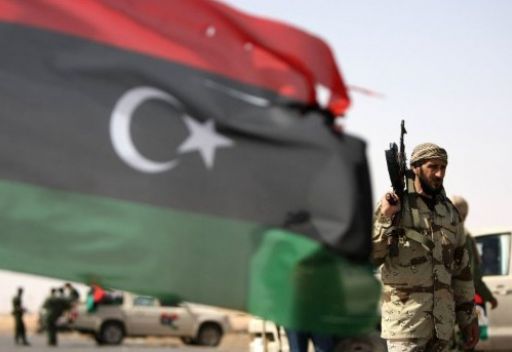
The participants in Wednesday's march, some honking their car horns and shouting revolutionary slogans, said they were marking the first anniversary of the first protest held on the same day last year against the Kadhafi regime.
A small demonstration on February 15, 2011, also held by relatives of the 1996 Abu Salim massacre to secure the release of their lawyer, Fethi Tarbel, then turned into a massive anti-Kadhafi uprising from February 17.
Tarbel is now Libya's sports minister.
The bloody uprising rapidly spread across the north African country and ended with the killing of Kadhafi at his hometown in Sirte on October 20.
Thousands of people were killed and wounded in the raging conflict, with young and old men taking up arms to fight Kadhafi's forces.
The ouster and death of the former strongman has become one of the main events of the so-called Arab Spring.
Libyans consider February 17 as the actual day when the anti-Kadhafi uprising first erupted.
There are no state sponsored celebrations planned on Friday to mark the first anniversary of the conflict, but local councils are holding commemorations to mark the event.
"Today we feel that justice is done to all those who suffered in Abu Salim," said 60-year-old Fatima Abdallah, whose 26-year-old son Jumaa was one of more than 1,200 people killed in 1996.
"God has blessed Libya. The dictator is dead and justice has been done to us," she said, holding her son's photograph in her lap as she sat on a chair with several others who lost their relatives in the massacre.
Kadhafi's regime is accused of carrying out the prison killings against inmates demanding better living conditions. Most of the prisoners were opponents and critics of the former dictator.
The prisoners were shot to death and buried in mass graves, with most family members not even informed of their deaths until 2009.
"The last time I saw my son was in 1992. After that we came to know only about his death in 1996 in the prison," said Hamid Sultan, 60, as next to him the son of Libya's national hero Omar Mukhtar lit the symbolic torch.
"My son, Ibrahim, was arrested in 1989. He was a student leader and spoke fluent English," said Sultan, as the crowds behind him chanted "Benghazi you are the greatest city, the world knows you now!"
The protesters began the march in front of the Benghazi police headquarters, the site of last year's first protest, and hundreds later converged in the city's landmark Tahrir Square, where the first major rally against Kadhafi broke out two days later.
A small girl on the stage in Tahrir chanted: "Saadi, Saadi, you can come to Libya, we are ready for you!" in a mocking reference to one of Kadhafi's fugitive sons, who last week warned that a nationwide rebellion was brewing and vowed to return to Libya "at any time."
-------------------------------------------------------------------------------------------
A small demonstration on February 15, 2011, also held by relatives of the 1996 Abu Salim massacre to secure the release of their lawyer, Fethi Tarbel, then turned into a massive anti-Kadhafi uprising from February 17.
Tarbel is now Libya's sports minister.
The bloody uprising rapidly spread across the north African country and ended with the killing of Kadhafi at his hometown in Sirte on October 20.
Thousands of people were killed and wounded in the raging conflict, with young and old men taking up arms to fight Kadhafi's forces.
The ouster and death of the former strongman has become one of the main events of the so-called Arab Spring.
Libyans consider February 17 as the actual day when the anti-Kadhafi uprising first erupted.
There are no state sponsored celebrations planned on Friday to mark the first anniversary of the conflict, but local councils are holding commemorations to mark the event.
"Today we feel that justice is done to all those who suffered in Abu Salim," said 60-year-old Fatima Abdallah, whose 26-year-old son Jumaa was one of more than 1,200 people killed in 1996.
"God has blessed Libya. The dictator is dead and justice has been done to us," she said, holding her son's photograph in her lap as she sat on a chair with several others who lost their relatives in the massacre.
Kadhafi's regime is accused of carrying out the prison killings against inmates demanding better living conditions. Most of the prisoners were opponents and critics of the former dictator.
The prisoners were shot to death and buried in mass graves, with most family members not even informed of their deaths until 2009.
"The last time I saw my son was in 1992. After that we came to know only about his death in 1996 in the prison," said Hamid Sultan, 60, as next to him the son of Libya's national hero Omar Mukhtar lit the symbolic torch.
"My son, Ibrahim, was arrested in 1989. He was a student leader and spoke fluent English," said Sultan, as the crowds behind him chanted "Benghazi you are the greatest city, the world knows you now!"
The protesters began the march in front of the Benghazi police headquarters, the site of last year's first protest, and hundreds later converged in the city's landmark Tahrir Square, where the first major rally against Kadhafi broke out two days later.
A small girl on the stage in Tahrir chanted: "Saadi, Saadi, you can come to Libya, we are ready for you!" in a mocking reference to one of Kadhafi's fugitive sons, who last week warned that a nationwide rebellion was brewing and vowed to return to Libya "at any time."
-------------------------------------------------------------------------------------------









 Home
Home Politics
Politics









